#also been watching hella art tutorials lately
Explore tagged Tumblr posts
Text
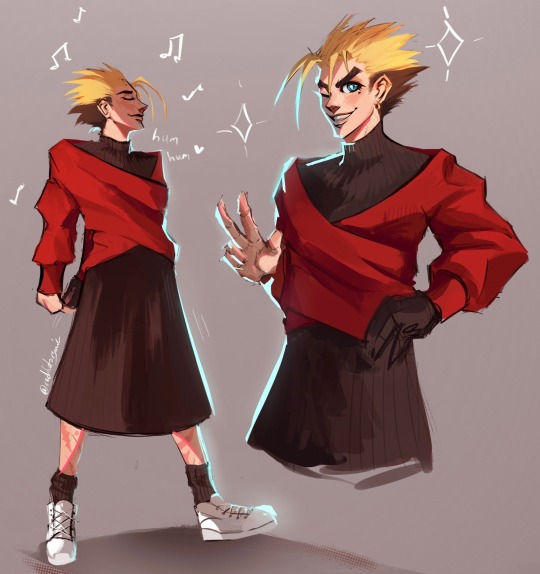
Love putting this guy in outfits!
#randomly stumbled across this fit while on pinterest last night and he immediately came to mind cuz I’m sooooo smart and you agree <333#there was a lil purse thing but I didn’t wanna do it 🙏#<- man who is Lazy#also been watching hella art tutorials lately#you should go look at bluebiscuits I believe they’re called#good shit fr !!!#trigun#vash the stampede#trigun maximum#trigun fanart
135 notes
·
View notes
Text
Art Career Tips, 2021 Edition
Here’s an edited version of my 2019 answered ask, because... this feels relevant.
It is a problem of capitalism that folks equate their income as a judgement of their value as people; and let me preface. You are worth so much. You have inherent value in this world. Your income is not a judgement on who you are (plenty of billionaires are actively making the world worse). LARPing self-confidence will go a long way to helping you get paid more for your work, because clients will believe that you know what you are doing, and are a professional.
& real quick—my own background is that I’ve been living off my art since 2018. I went to art school (Pratt Institute). I work in a publishing/educational materials sphere, and a quarter of my income is my shop. Not all of this information may apply to you, so it is up to you to look through everything with a critical eye, and spot pick what is relevant.
So there are multiple ways of getting income as an artist;
Working freelance or full-time on projects
Selling your stuff on a shop
Licensing (charging other companies to use your designs)
This post primarily covers the freelance part; if you’re interested in the other bits there is absolutely info out there on the internet.
IF you are just starting (skip to next section if not applicable) dream big, draw often (practice helps you get better/more efficient), do your best to take "a bad piece” lightly. You’re gonna RNG this shit. At some point your rate of “good” works will get higher. Watch tutorial videos & read books. A base understanding of “the rules”; anatomy, perspective, composition, color helps you know what the rules are to break them. This adds sophistication to your work. One way you can learn this stuff is by doing “studies”—you’re picking apart things from life, or things other people have done, to see what works, and how it works.
Trying to turn your interests into a viable career means that you are now a SMALL BUSINESS; it really helps to learn some basic marketing, graphic design, figure out how to write polite customer service emails; etc. You can learn some of this by looking it up, or taking skillshare (not sponsored) classes by qualified folks. Eventually some people may get agents to take care of this for them—however, I do recommend y’all get a basic understanding of what it takes to do it on your own, just so you can know if your agent is doing a good job.
Making sure your portfolio fits the work you want to get
Here is a beginner portfolio post.
Research the field you’d like to get into. The amount people work, the time commitment, the process of making the thing, the companies & people who work for them.
Create work that could fit in to the industry you’re breaking into. For example, if you want to do book cover illustration, you draw a bunch of mockup book covers, that can either be stuff you make up, or redesigns of existing books. If you’re not 100% sure what sort of work is needed for the industry, loop back into the portfolios of artists in a similar line of work as whatever you’re interested in, and analyze the things they have in common. If something looks to be a common project (like a sequence of action images for storyboard artists), then it’s probably something useful for the job.
CLIENTS HIRE BASED ON HOW WELL THEY THINK YOUR WORK FITS WHAT THEY WANT. If they’re hiring for picture books, they’re gonna want to see picture book art in your portfolio, otherwise they may not want to risk hiring you. Doesn’t have to be 100% the project, but stuff similar enough. If you aren’t hired, it doesn’t mean your work is bad, it just wasn’t the right fit for that specific client.
If you have many interests, make a different section of your portfolio for each!
Making sure you’re relevant
Have a social media that’s a little more public-facing, and follow people in the career field you’re interested in. Fellow artists, art directors, editors, social media managers; whoever. Post on your own schedule.
Interact with their posts every so often, in a non-creepy way.
If you’ve made any contacts, great! Email these artists, art directors, editors, former professors, etc occasional updates on your work to stay in touch AND make sure that they think about you every so often.
Show up to general art events every once in a while! If you keep showing up to ones in your area (when... not dying from a sneeze is a thing), folks will eventually start to remember you.
Industry events & conferences can be pricey, so attend/save up for what makes sense for you. Industry meetups are important for networking in person! In addition to meeting people with hiring power, you also connect with your peers in the community. Always bring a portfolio & hand out business cards like candy.
Active job hunting
Apply to job postings online.
If interested in working with specific people at specific companies, you could send an email “I’d love to work with you, here’s my portfolio/relevant experience”, even if they aren’t actively looking for new hires. Be concise, and include a link to your work AND attached images so the person reading the email can get a quick preview before clicking for more.
Twitter job postings can be pretty underpaid! Get a copy of the Graphic Artists’ Guild Handbook Pricing & Ethical Guidelines to know your rate. I once had a twitter post job listing email me back saying that other illustrators were charging less, and I quote, “primarily because they’re less experienced and looking for their first commission”. This was not okay! For reference, this was a 64-illustration book. The industry rate of a children’s book (~36 pages) is $10k+, and this company’s budget was apparently $1k. For all of it.
Congrats you got a job! Now what?
Ask for like, 10% more than they initially offer and see if they say yes. If they do, great! If not, and the price is still OK, great! Often company budgets are slightly higher than they first tell you, and if you get this extra secret money, all the better for you.
Make sure you sign a contract and the terms aren’t terrible (re: GO GET THE Graphic Artists’ Guild Handbook Pricing & Ethical Guidelines)
Be pleasant and easy to work with (Think ‘do no harm but take no shit’)
Communicate with them as much as needed! If something’s going to be late, tell them as soon as you know so they aren’t left wondering or worse, reaching out to ask what’s up.
And if all goes well, they’ll contact you about more jobs down the line, or refer you to other folks who may need an artist, etc.
Quick note about online shops/licensing and why they’re so good
It’s work that you do once, that you continuously make money off of. Different products do well in different situations (conventions vs. online, and then further, based on how you market/the specific groups you are marketing to), so products that may not do well initially may get a surge later on.
Start with things that have low minimum order quantity and are relatively cheap to produce, like prints and stickers.
If you are not breaking even, go back to some of the earlier portions of this and think about how you could tweak things as a small business. Ease of access is also very important with this; for example, if you only take orders through direct messages, that immediately shuts off all customers who don’t like talking to strangers.
Quick resource that you could look through; it’s the spreadsheet of project organizing that I made a while back
Licensing is when people pay you for the right to use your work on stuff they need to make, like textbooks or greeting cards. This is generally work you’ve already made that they are paying the right to use for a specified time or limited run of products. This is great because you’ve already done the work. I am not the expert on this. Go find someone else’s info.
“I am not physically capable of working much”/ “I need to pay the bills”
Guess who got a hand injury Sept 2020 that messed me up that entire month! I had a couple jobs going at the time that I was terrified of losing, but they were quite understanding when I told them I needed to heal. So: Express your needs as early as you know you need them. Also do lots of stretches and rest your hands whenever you feel anything off; this will save your health later. Like, the potential of a couple months of no income was preferable over losing use of my hands for the rest of my life.
This continues to apply if you have any other life situation. Ask for extra time. Ask for clarification. If you tell people ahead of time, folks are often quite understanding. Know how much you are capable of working and do your best not to overdo it. (I am.. bad at this)
Do what MAKES SENSE for your situation. If doing art currently earns you less money than organizing spreadsheets, then do that for now, and whenever you have the energy, break down some of the tips above into actionable tiny chunks, and slowly work at em.
The original ask I got in 2019 mentioned ‘knowing you’re not good enough yet’. Most artists experience imposter syndrome & self-doubt—the important thing is to do your best, and if anything, attempt to channel the confidence of a mediocre white man. If he can apply to this job/charge hella money for Not Much, then so can you!
Check out this Art Director tumblr for more advice!
Danichuatico’s Literary Agent guide
Kikidoodle’s Shop Shipping Tutorial
Best of luck!
–
Once again disclaimer this post is just the ramblings of a man procrastinating on other things that need to be done. I’ve Long Posted my own post so that it turns into mush in my brain if I try to read it, but I wrote this so I should know this content. If you got down here, congrats. Here’s a shrimp drawing.
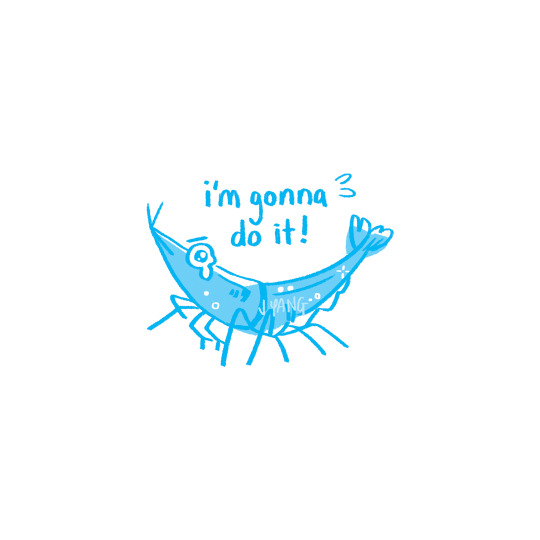
Yee Ha.
My reference post tag My tip jar
245 notes
·
View notes
Note
Hey I follow you on twitter!!! YOUR ART IS HELLA GORGEOUS AND IM HELLA JEALOUS!! I have a few questions for you if you don't mind :) 1. how old were you when you started gettin into art and 2. any tips for someone like me to be better at creating characters and getting better at digital art and just in general?
aAAA tHANK YOU!!!!! i’m sorry this reply is 3000 years late!!!
I’ve literally been always drawing. Like, ever since I could remember, I’ve been drawing and creating OCs and generally just vibin off in my own little world. [so easily a couple decades of just doodling]
with creating characters, especially when you’re just getting into the swing of it, you gotta let your creative brain derive influence from existing media. loads of artists feel compelled to be 110% original right out the gate, and this actually does more to hinder their creative flow since they won’t let themselves experiment and take inspiration from existing ideas. it’s not BAD to want to be original, just don’t ever make that your primary focus when designing.
take when I first started character design for example [if i could really call it that, i was just making OCs for shits and giggles at that age] I was particularly influenced by two primary things.101 Dalmatians, because that was my childhood obsession, and Cardcaptor Sakura
The result? a spotless Dalmatian OC named Saraberos. Here she is:

while spotless Dalmatians had been “done” and that big jewel around her neck [as well as her name] was Very reminiscent of Keroberos, she ended up her own adequately unique thing!! You just gotta take what you love, mash it all together and apply it in a fun new way!
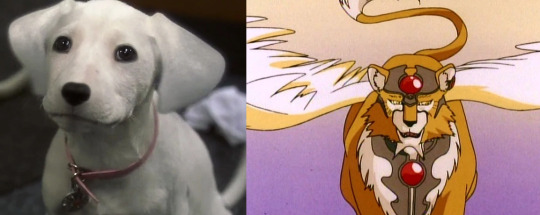
The same can be said about getting better at digital art!
Regardless whether its digital or traditional, getting better at art is something all artists strive for; but in trying to outdo our previous pieces we tend to forget that art is not a race.
A few key things I’ve personally helpful to remember while bettering myself:
watching/referring to tutorials is not cheating
using references is not cheating
other artists are your friends, not your competition
let yourself draw bad
every drawing you make, completed or not, is another little itty bit of experience towards your art goal[s]
it’s okay to play with art styles that aren’t yours, just don’t trace/plagiarize someone else’s work
always sign and/or watermark your work
never ever EVER value your art based on how much interaction it gets on social media. you’re still building your platform and bettering your skill. give it time and both will grow.
there will ALWAYS be artists younger and more talented than you; try not to take this to heart. they have access to art resources you yourself probably didn’t at their age. [tablets didn’t exist when I started, that’s for sure]
If you want to get better with digital art specifically, watch tutorials on Youtube! Ask artists about what brushes and programs they use! I personally use Clip Studio Paint for all my work. It regularly goes on sale, and unlike Photoshop [which I do not recommend ANYONE to use, don’t do it, do not give Adobe your money] you only need to pay for the program once. Clip Studio also boasts a huge catalog of art resources created by other artists that you can download and use to your heart’s content. Sometimes you have to pay for things, but you can usually find really really good brushes for free. Clip Studio should really give me money for how much I boast about their software to everyone fkljgld
Also, don’t be afraid to draw inspiration from your artist peers. If you see someone drawing something that makes you nod your head and say “huh, I wanna draw like that”, then do it! Do art studies! Experiment! Draw good! Draw bad! The world ends at your horizons, so don’t be afraid to grasp your pen and create!!
53 notes
·
View notes
Text
Artist Interview with Daphne Hutcheson
Last week I had the opportunity to speak with Daphne Hutcheson, an artist I’ve admired for quite some time. Her work and knowledge in the arts has helped me, along with many other artists in the online community.
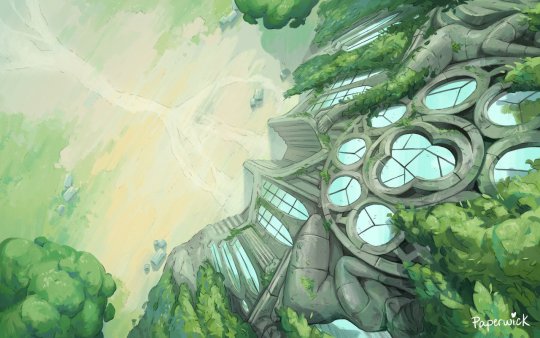
Daphne Hutcheson, also known as @paperwick on social media, has been creating artwork from a very young age, with works in both traditional and digital media. Her work covers a broad range of fandoms, original content, and client based works along with some very useful and resourceful tutorials.
K: I wanted to first ask about your experience attending SCAD (Savannah College of Art & Design)?
D: My experience at SCAD was tepid at best. The teachers were good, but I mean very specifically the professors who were teaching in my major, which was sequential art. SCAD is really not a great institute for anyone who isn't rich enough for their parents' to cover the cost. That's my biggest issue with it, they will cripple you with debt, so if anyone is lower-income, I would highly suggest learning via some of great online courses or using a state college's art program to sort of direct you if you need direction and deadlines. I know I need them. SCAD's loans are no joke. The college itself was very good my first year, they do a lot to make sure incoming students feel heard and welcomed, and then after that they really don't try for you. As soon as you're a sophomore, they could care less about how you feel to be there. Their class attendance requirements are grueling and there's no room for accidents--you miss four class sessions and you fail the course. It's wild, and even if you're in the hospital, those absences will not be forgiven. If you're late, it counts as an absence.I don't recommend it. At all. All the learning I garnered there is online accessible these days, one just has to hunker down, find it, and put it to practice. My professors were great, but no education is worth that price tag. Depending on your major there, you will be treated differently by the school. For example, their fashion and fibers majors are doted on, whereas a major like animation is ground hard into the dirt. There were unrealisitc deadlines to meet for class projects and kids would be in the school buildings overnight trying to meet them. Some fell asleep in their chairs and Paula Wallace (the owner) saw that one day and had them replace the chairs with far less comfortable chairs. Some kids had heart attacks from staying up to meet deadlines. Such a bad work culture of "all-nighters". In part the students' fault, but none of the faculty really stopped it or discouraged it, save one teacher in a different major, and that being said, that teacher still gave ridiculous deadlines so we'd "be prepared for the industry". That's not at all what the industry is like (discluding the game industry right now). It is truly a hard place to thrive and everyone I've known who has graduated had months to years of burnout after finishing, including myself. I'd hazard real caution when choosing to go to a private art college, art institutes included.No education is worth that amount of debt.
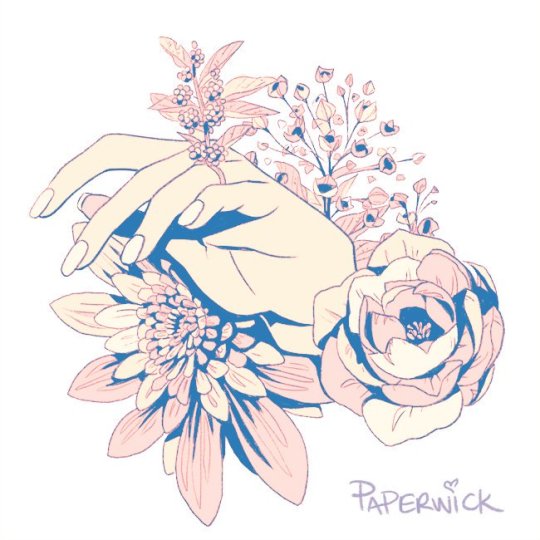
K: Wow, that’s unfortunate to hear. I wonder if students are having similar experiences at colleges such as CAD or RISD?
D: I have heard very similar things about places like RISD and CAD where it’s all about the money, but I can’t point you towards any of the specifics. I really just want people to go into it with a clear head and know it’s going to be hard exiting. They really don’t prepare you for business.
K: What would you have done differently? Would you have signed up for online courses?
D: If I was to do it over, I would have liked to dive straight into developing personal projects, just making the work. Watching and reading free youtube videos and blog posts by artists. That would not have flown with my parents, they’re very by the book “go to college or get a job” type people. With than in mind, I would’ve gone to the local college I was within biking distance of as a sort of clean, and done fairly half assed studies by full assed my artwork.
K: That sounds like what a lot of artists, particularly those interested in digital art are doing. But, have you ever considered going back to school, or enrolling in a program or an atelier that you think would be beneficial to your art career?
D: Not genuinely. If I had time, I wouldn't mind enrolling in something that would teach me puppet animation, but between freelance and my day job, it's hard to find time to produce personal work and then also learn. I am pro-learning, always learning because that keeps your work fresh, keeps your mind sharp and ready to switch up on a dime. But course work is something I'm not super fond of, to be honest.

K: I understand. So, you've graduated and are currently doing freelance work along with your other day job. In your freelance work, what kind of work are you taking from clients?
D: Mostly I do storyboard animatics for a few advertising agencies, but I do some card art for games here and there, like Companion's Tale. I just signed on to do some tarot card artwork for a company called Legacy: Fables. I'll take anything that sounds interesting and that I have time for. It's all digital; traditional art is way more personal for me so I almost exclusively make traditional artwork as gifts for friends.
K: Are there any particular fandoms or genres that you tend to work more in?
D: As far as fandom work and commissions, it's Dragon Age all the way BABY! It's a good community and I owe a lot to them. I'm planning on reopening my tarot commissions here soon once I finish up a few of my freelance projects. I am an old hat with fantasy stuff and most comfortable there, but I really want to start working on robots and mechanics and cities. All that sci-fi goodness.
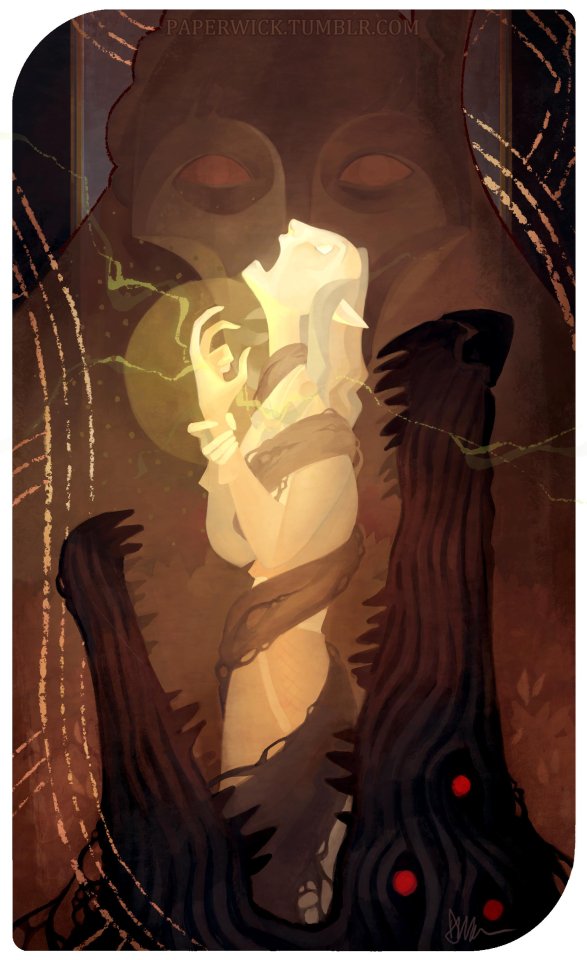
K: Wow, that's great to hear you've got very steady work, and they’re with industries and agencies! I hope you'll get to share that work once it's gone down the production pipeline. Have you ever considered applying for work with a company like EA/Bioware?
D: Yeah! I've lucked out a lot, it feels like all of this sort of dumped itself in my lap. My biggest resistance to applying to Bioware or any gaming industry position right is rooted in how they treat their workers. Bioware, specifically back when Anthem was released, had a nasty report come out on how management had run their workers to the point of many having mental breakdowns, and several just leaving and never coming back. They refer to those who have breakdowns while working during their months and months of crunch as "stress casualties", and I'm honestly quite disgusted by what I hear. I think once the gaming industry unionizes I'll consider applying, but the things I hear, not just about Bioware and EA... It's horrifying. Riot, Blizzard, Activision, Treyarch, Rockstar... the list could go on. Not to like tank the conversation into a dark place, I just have such strong feelings about it.
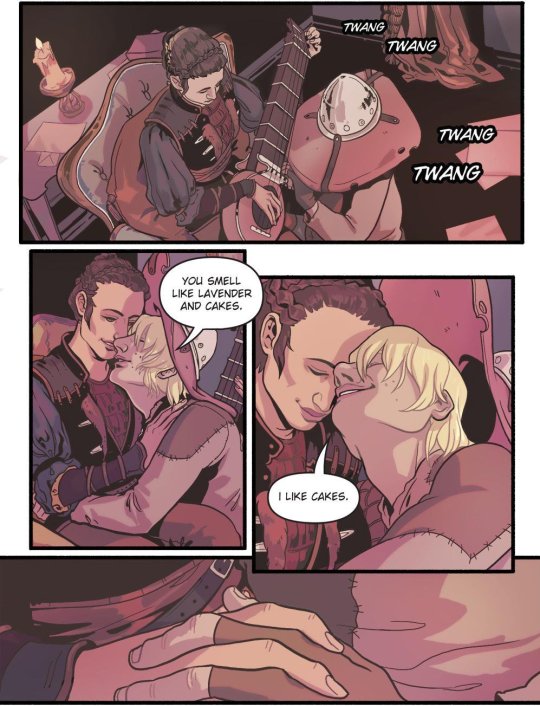
K: That's ok! It's good to hear different perspectives, especially when talking about the industry. Alright, on to the next question. Looking at your work, from sequential narrative to tarot artwork, I’m really impressed by your storytelling. When you’re creating stories and characters, do you pull a lot from your own experiences and emotions, or more from other sources such as music, film, or literature?
D: Ahh that's a hard one. I think I pull far more from outside of me than inside of me.The way things are shaped comes from my own experience, but I think a lot of my content comes from outside influences, like movies, books, music, and art.Howls Moving Castle, the book not the film, had a huge affect on me and how light I want the stories I tell to be, but I think I have a long way to go when putting stories together.I am super empathetic so it's easy to take outside influences and really feel them, but also it's hard to tell where I start and those influences ends.
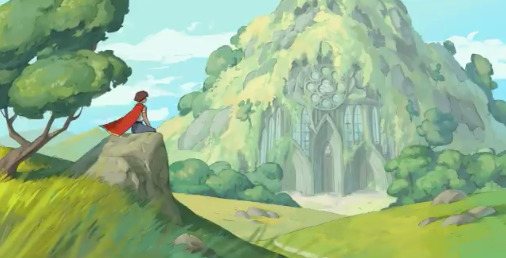
K: Very well said, and the comment about the novel, I can really feel that in your personal work, especially your recent animated landscape piece.
D: Thanks!
K: The first time I came across your work was one of your Dragon Age tarot works, but also the tutorial on how you created them. It was incredibly helpful to me and I know to lots more artists. Your tutorials and words of advice have proven very successful, but have you ever received any advice or tutorials that really switched gears or level upped your techniques?
D: The answer is yes, absolutely. Let me see, I don't seek out tutorials anymore, but there was something I saw recently that was good. Sinix's head from any angle is a great approach to drawing faces at crazy angles. Also, check out Bunabi on Tumblr. Bunabi is so fast and her work is beautiful, and has great tutorials also, just incredible.
I unfortunately can’t link to any specifics, but tutorials like this one do me a lot of good.
People can just screenshot process stuff that reminds me that there are a million ways to approach art, like sketch up, grids, freehanding. I think I benefit from understanding that there are a million approaches more than following the tutorials super hard.
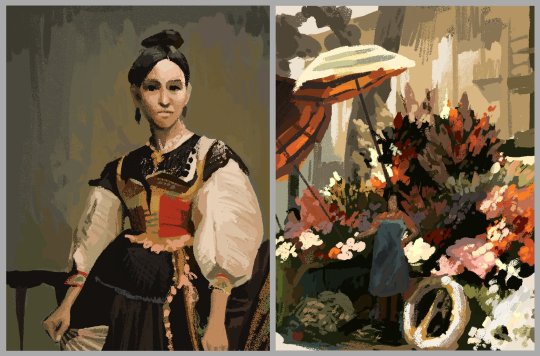
K: Great,thank you! I wanted to ask a few more questions, one about your Patreon. It seems like the next big wave for digital artists. How has it been creating one and keeping on top of the awards, and is there anything you would want to do differently with yours?
D: So Patreon is kind of a basket you can fill with prizes, maybe some of the prizes for money (probably prizes for money), and that works for a lot of people. I have a more of a "here's content I don't put elsewhere if you'd like it" approach to it cause I'm inconsistent with patron pay-outs. Patreon for artists with chronic mental illness is a struggle. Hands down. I started one hoping it would iron out my discipline issues a year or two back, and it didn't. It made me feel hella guilty cause I could not keep up with what I said I'd keep up with, and then I felt worse. It was disastrous. I refunded most of the pledges I got during the three months I had it open. Then I closed it for a year and brought it back online recently. Now all my content is free, it's still inconsistent, but if people want to support me I welcome it. I think Patreon is a good platform, but I will never be able to use it is intended. I respect the people who can keep up with it all, that kind of discipline takes a crazy amount of strength of character, but I don't motivate with money very well. In the end, I motivate through helping others as best I can, so it'll always be free content. I have very few plans for it, other than I want to put together a brush pack and share it there with brushes I made. I just need a moment to sit down and make that happen. I've got a tutorial for using photos to make quick painted backgrounds too, and I just have to organize that sucker.
K: Thank you for being so open about it. I think what you're doing is so insightful and helpful in what you're offering to your followers, especially those who may also be struggling with anxiety and depression.
K: Can you share what your process is like from a sketch to a finished piece? Do you thumbnail a lot before, use references to build from, and so on?
D: I like to do throw away thumbnails on notepaper.
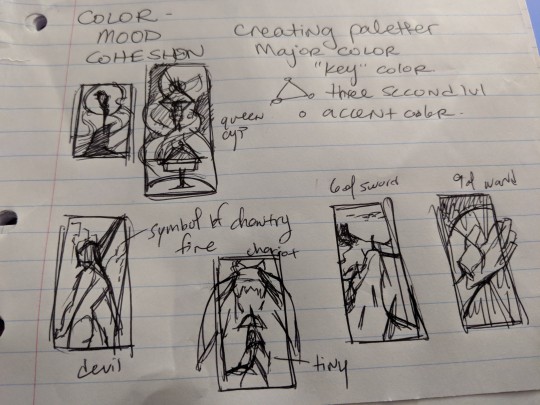
And then I take those thumbnails and do a more thought out version digitally.
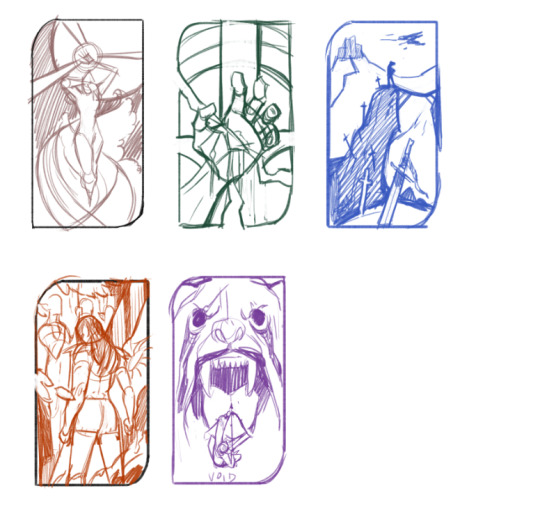
K: Wow, these are both beautiful. If you don't share these with patrons already, I would! I also like that you've given each one their own color, a good way to organize!
D: Thank you! I'll make sure to share these, I forget about them genuinely. I'll diverge in two directions from here depending on need. If what I'm working on is simple, I hop straight into color. If it's going to be complicated, ie crazy armor, specific architecture, I will do a line pass first and then launch into color. Either way, this is where most of my references come into play. Once that is solid I add detail work.
K: Reference can be so important in art; it really can bring work to a new level if used properly!
D: Yeah reference is king. I use it constantly, even when doing the most stylized thing, cause there's always stuff you forget. The waves I did for my last card, I had reference of barrel waves up constantly, and it helps a ton.
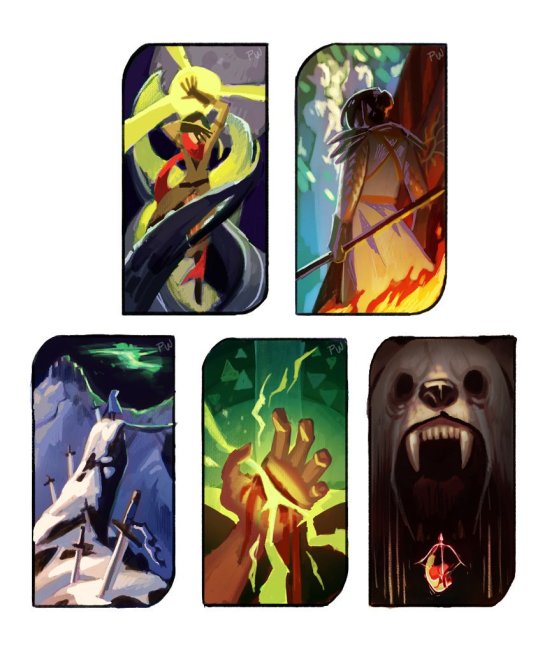
K: My last question is where do you see yourself in five years? I know this can be a challenging question, but if you had any goals or plans you’d like to see come into fruition, what would they be?
D: Five years? These questions are always a struggle for me. I try not to look past a week at a time because it's all so BIG. And my life has undergone so many huge changes in such a short period of time SO MANY times that it's hard to make long term plans. Especially when dealing with mental illness. So I try to think less about where I'll be in any amount of time, and more about what I want to progress towards achieving, it's a little easier and sets up less expectation. So this is not necessarily a five year plan, and more an eventual future plan. I want to have enough tutorial work to put together an art resources book/pdf online. I want to develop my freelance work further and create my own studio, ideally for illustrative style work, smaller animations, and maybe some classes for people interested in color and storytelling. I want to put together a small guide of sorts also for artists and people who need healing, since there's so many of us. That one is harder because it's an amorphous subject, but I think there's a lot of room for commentary there and a lot of people wanting to hear it, and I think it'll have to come from all those hurting. It's just a matter of how we'll organize that.I am a huge sap. That's my way. So in 5 years I'm hoping I'll be a better and more helpful sap.
K: Well, I hope you're able to make a lot of this happen, we need more empathy and help in the world. Thank you again Daphne for your time, this was really informative and an honest interview which I know others will appreciate.
D: Thank you, Kallie!
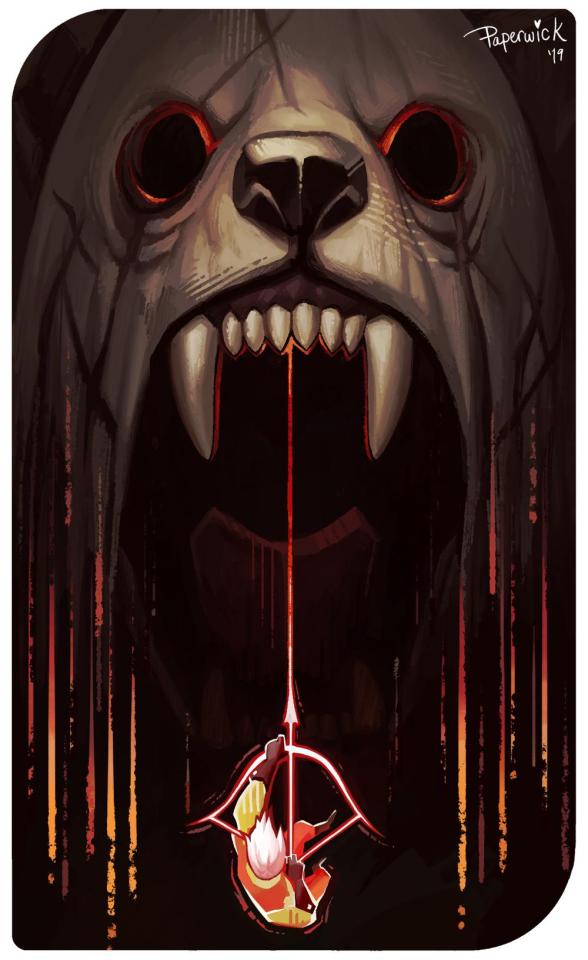
You can find more of Daphne’s beautiful works (and tutorials) here:
Patreon
Twitter
Tumblr
304 notes
·
View notes